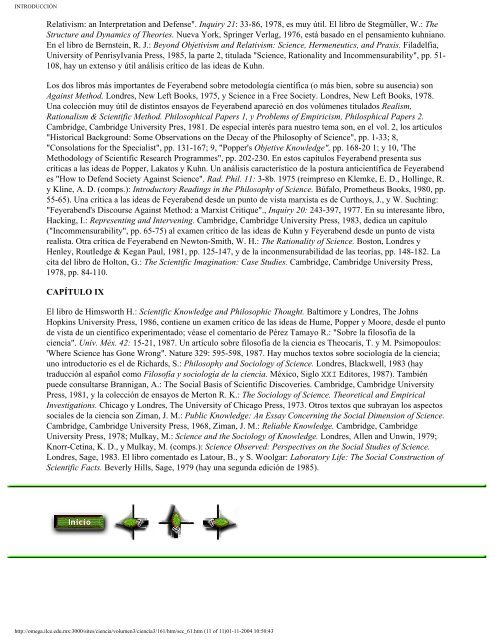Ruy Pérez Tamayo – ¿Existe el método científico?
Ruy Pérez Tamayo – ¿Existe el método científico?
Ruy Pérez Tamayo – ¿Existe el método científico?
Create successful ePaper yourself
Turn your PDF publications into a flip-book with our unique Google optimized e-Paper software.
INTRODUCCIÓN<br />
R<strong>el</strong>ativism: an Interpretation and Defense". Inquiry 21: 33-86, 1978, es muy útil. El libro de Stegmüller, W.: The<br />
Structure and Dynamics of Theories. Nueva York, Springer Verlag, 1976, está basado en <strong>el</strong> pensamiento kuhniano.<br />
En <strong>el</strong> libro de Bernstein, R. J.: Beyond Objetivism and R<strong>el</strong>ativism: Science, Hermeneutics, and Praxis. Filad<strong>el</strong>fia,<br />
University of PenrisyIvania Press, 1985, la parte 2, titulada "Science, Rationality and Incommensurability", pp. 51-<br />
108, hay un extenso y útil análisis crítico de las ideas de Kuhn.<br />
Los dos libros más importantes de Feyerabend sobre metodología científica (o más bien, sobre su ausencia) son<br />
Against Method. Londres, New Left Books, 1975, y Science in a Free Society. Londres, New Left Books, 1978.<br />
Una colección muy útil de distintos ensayos de Feyerabend apareció en dos volúmenes titulados Realism,<br />
Rationalism & Scientific Method. Philosophical Papers 1, y Problems of Empiricism, Philosphical Papers 2.<br />
Cambridge, Cambridge University Pres, 1981. De especial interés para nuestro tema son, en <strong>el</strong> vol. 2, los artículos<br />
"Historical Background: Some Observations on the Decay of the Philosophy of Science", pp. 1-33; 8,<br />
"Consolations for the Specialist", pp. 131-167; 9, "Popper's Objetive Knowledge", pp. 168-20 1; y 10, 'The<br />
Methodology of Scientific Research Programmes", pp. 202-230. En estos capítulos Feyerabend presenta sus<br />
críticas a las ideas de Popper, Lakatos y Kuhn. Un análisis característico de la postura anticientífica de Feyerabend<br />
es "How to Defend Society Against Science". Rad. Phil. 11: 3-8b. 1975 (reimpreso en Klemke, E. D., Hollinge, R.<br />
y Kline, A. D. (comps.): Introductory Readings in the Philosophy of Science. Búfalo, Prometheus Books, 1980, pp.<br />
55-65). Una crítica a las ideas de Feyerabend desde un punto de vista marxista es de Curthoys, J., y W. Suchting:<br />
"Feyerabend's Discourse Against Method: a Marxist Critique"., Inquiry 20: 243-397, 1977. En su interesante libro,<br />
Hacking, I.: Representing and Intervening. Cambridge, Cambridge University Press, 1983, dedica un capítulo<br />
("Incommensurability", pp. 65-75) al examen crítico de las ideas de Kuhn y Feyerabend desde un punto de vista<br />
realista. Otra crítica de Feyerabend en Newton-Smith, W. H.: The Rationality of Science. Boston, Londres y<br />
Henley, RoutIedge & Kegan Paul, 1981, pp. 125-147, y de la inconmensurabilidad de las teorías, pp. 148-182. La<br />
cita d<strong>el</strong> libro de Holton, G.: The Scientific Imagination: Case Studies. Cambridge, Cambridge University Press,<br />
1978, pp. 84-110.<br />
CAPÍTULO IX<br />
El libro de Himsworth H.: Scientific Knowledge and Philosophic Thought. Baltimore y Londres, The Johns<br />
Hopkins University Press, 1986, contiene un examen crítico de las ideas de Hume, Popper y Moore, desde <strong>el</strong> punto<br />
de vista de un <strong>científico</strong> experimentado; véase <strong>el</strong> comentario de <strong>Pérez</strong> <strong>Tamayo</strong> R.: "Sobre la filosofía de la<br />
ciencia". Univ. Méx. 42: 15-21, 1987. Un artículo sobre filosofía de la ciencia es Theocaris, T. y M. Psimopoulos:<br />
'Where Science has Gone Wrong". Nature 329: 595-598, 1987. Hay muchos textos sobre sociología de la ciencia;<br />
uno introductorio es <strong>el</strong> de Richards, S.: Philosophy and Sociology of Science. Londres, Blackw<strong>el</strong>l, 1983 (hay<br />
traducción al español como Filosofía y sociología de la ciencia. México, Siglo XXI Editores, 1987). También<br />
puede consultarse Brannigan, A.: The Social Basis of Scientific Discoveries. Cambridge, Cambridge University<br />
Press, 1981, y la colección de ensayos de Merton R. K.: The Sociology of Science. Theoretical and Empirical<br />
Investigations. Chicago y Londres, The University of Chicago Press, 1973. Otros textos que subrayan los aspectos<br />
sociales de la ciencia son Ziman, J. M.: Public Knowledge: An Essay Concerning the Social Dimension of Science.<br />
Cambridge, Cambridge University Press, 1968, Ziman, J. M.: R<strong>el</strong>iable Knowledge. Cambridge, Cambridge<br />
University Press, 1978; Mulkay, M.: Science and the Sociology of Knowledge. Londres, Allen and Unwin, 1979;<br />
Knorr-Cetina, K. D., y Mulkay, M. (comps.): Science Observed: Perspectives on the Social Studies of Science.<br />
Londres, Sage, 1983. El libro comentado es Latour, B., y S. Woolgar: Laboratory Life: The Social Construction of<br />
Scientific Facts. Beverly Hills, Sage, 1979 (hay una segunda edición de 1985).<br />
http://omega.ilce.edu.mx:3000/sites/ciencia/volumen3/ciencia3/161/htm/sec_61.htm (11 of 11)01-11-2004 10:50:43


